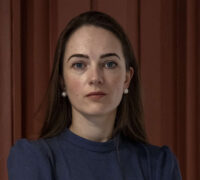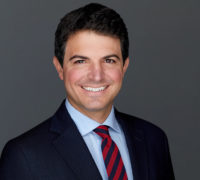Matviichuk said all Western companies still doing business in Russia are contributing to Putin’s war chest, as well as undermining a rule of law system upon which they rely to protect their property and assets, and build and grow companies.
“All Western companies who still sell in Russia have to be aware that they finance this bloody war, and this is their responsibility,” she said, calling for a mindset shift.
“The problem is that people in well-developed democracies start to forget the importance of democracy, rule of law, and human rights. Because they inherited their system from their parents, they have never had to fight for it; they take it for granted,” she said. “It’s beyond common sense, being a beneficiary of this system, to help an enemy of the system to ruin it.”
This was not just a problem of international business. Many Ukrainian companies first ignored the issue when Russia occupied Crimea and parts of the Luhansk and Donetsk regions in eastern Ukraine in 2014.
“People started to notice that war was going on, only when bombs were falling on their heads. But war has an economical dimension, informational dimension, and value dimension. So, I urge Western business to be on the right side of history,” she said.
In the research article that Simon Evenett and I just published, we identify push and pull factors facing Western business with operations in Russia, some of which are related to the unfolding Western sanctions regimes; the stringent Russian countersanctions regime; the pre-invasion state guarantees provided by Western governments to their firms investing abroad; and the norms on business conduct established by the OECD and UN. Our analysis helps to understand why exiting from Russia has not been straightforward. For instance, the Kremlin has set up legal impediments that make it hard and costly for businesses to exit Russia, and in some cases has threatened employees of firms looking to leave.
Matviichuk acknowledged it will be impossible to stop trading and doing business with all non-democratic countries in the world, but emphasized that working to support the spread of freedom will ultimately make it simpler and easier for businesses to operate.
Without a rule of law, business cannot operate successfully
For Matviichuk, who previously had a successful corporate career, her own decision to focus on fighting for freedom and human rights came after former President Viktor Yanukovych slapped a huge fabricated fine on the Association of Ukrainian Banks, where she worked, after its president criticized Yanukovych’s financial policy.
“This was a turning point for me. I understood that I have to choose, and I have to concentrate on fighting for freedom and for human rights because without this system of rule of law, you can’t do business successfully,” she said.
Since then, she has recorded interviews with hundreds of people who have survived captivity and shared stories of how they were beaten, raped, and tortured in the most horrific circumstances. This remains a major motivation in her quest to restore international order and provide justice to all those affected by the war.
“Working with people who survived hell, I am confident they need to restore not just their broken life, broken families, broken vision of the future, but their broken belief that justice is possible,” she said.
For Ukraine, victory won’t just happen when Russian troops withdraw, international order is restored, and all regions of the country are released from occupation, she said. “The victory of Ukraine also means to succeed in the democratic transition of our country, to build a country where the rights of everybody are protected, government is accountable, judiciaries independent, business can develop, and police do not beat students who are peacefully demonstrating.”
Matviichuk criticized the leaders of international organizations who, in the early days of Russia’s invasion, evacuated their staff and abandoned the Ukrainian people. In times of crisis, courageous leaders need to learn to push the override button on normal procedures and regulations, to save people’s lives, she said.
The war has nonetheless made it clear to her that when you can’t rely on the international system of peace and security, you can rely on ordinary people to do extraordinary things.
A “post-knowledge” era
While many commentators have acknowledged that we are living in a “post-truth” era, where objective facts hold less sway over public opinion than appeals to emotions and personal beliefs, Matviichuk also said we are entering a “post-knowledge” era. This means expertise is being devalued in favor of simple soundbites and there is a failure to recognize that complex situations need complex answers.
In such times, it becomes more important than ever to amplify the voices of civil society, actors, and intellectuals who are fighting for more democracy and to advance human rights for a more peaceful future.
Matviichuk, who was awarded the Nobel Peace Prize in 2022, expressed her solidarity with this year’s laureate, Narges Mohammadi from Iran, who has worked for years to advance the rights of Iranian women and remains imprisoned.
“Our world is very interconnected,” she said. “I live in Kyiv and my native city is constantly being shelled, not just by Russian rockets, but also Iranian drones. And if authoritarian regimes cooperate, we as a people who believe in democracy, rule of law, and freedom, have to support each other even stronger.”
YouTube

 Podcast available
Podcast available


 Podcast available
Podcast available